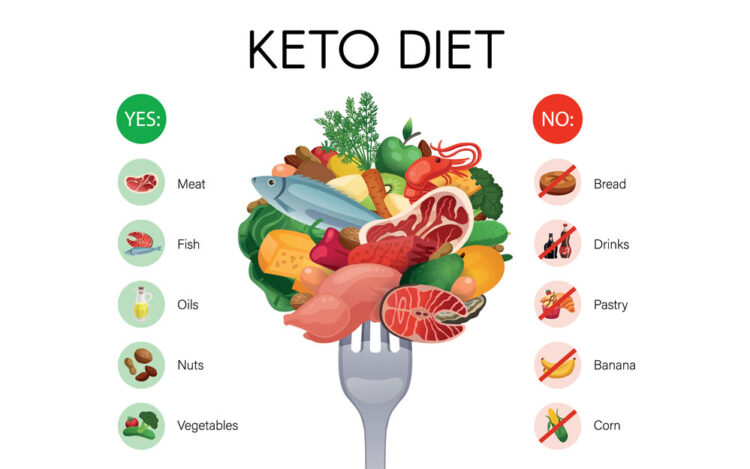Table of Contents
Embarking on a journey through the world of diets and nutrition brings us to the widely discussed and often debated Keto Diet. Known for its high-fat, low-carb approach, the Keto Diet has garnered attention for its potential to prompt significant weight loss, enhance metabolic health, and even impact chronic health conditions. This comprehensive blog post delves into the intricacies of the Keto Diet, exploring its pros and cons, scientific evidence, impact on health conditions, and much more.
From understanding the basic principles of the Keto Diet to unraveling the myths and facts surrounding it, this guide offers a detailed overview for anyone curious about or considering this popular dietary approach. Whether you are a nutrition enthusiast, someone looking to manage weight, or simply interested in healthy living, this blog post aims to provide valuable insights and balanced perspectives on the Keto Diet. Let’s embark on this informative journey to discover what the Keto Diet truly entails and how it might fit into your lifestyle and wellness goals.
1 Introduction
The ketogenic diet, commonly known as the “keto diet,” has surged in popularity over recent years, attracting followers worldwide with its promise of quick weight loss and improved health. But what exactly is this diet, and what does adopting a keto lifestyle entail? This comprehensive guide aims to demystify the keto diet, diving into its pros and cons to help you make an informed decision.
Originating as a medical diet to treat epilepsy in the 1920s, the keto diet has evolved into a popular weight loss and health regimen. At its core, the keto diet involves drastically reducing carbohydrate intake and replacing it with fat. This dramatic shift in eating patterns puts your body into a metabolic state called ketosis, where fat, instead of carbs, is burned for energy.
While the keto diet has been praised for its potential benefits, like rapid weight loss and improved blood sugar levels, it’s not without its drawbacks. Some individuals experience side effects, and there are debates about its long-term health impacts. In this blog, we’ll explore both sides of the coin, giving you a balanced view of the keto diet’s potential benefits and risks.
As we delve into the details of the keto diet, remember that every individual’s experience can vary. What works for one person might not work for another, highlighting the importance of understanding the diet fully before diving in.
2 What is the Keto Diet?
The Keto Diet, short for the ketogenic diet, is a low-carb, high-fat diet that has gained attention for its potential to promote weight loss and improve overall health. The fundamental principle of the keto diet is to adjust the typical macronutrient distribution – drastically reducing carbohydrate intake and significantly increasing fat intake, with a moderate protein consumption.

When you follow a traditional diet, your body primarily relies on glucose, derived from carbohydrates, for energy. However, by drastically cutting down on carbs, the keto diet forces your body into a state known as ketosis. In ketosis, your body becomes incredibly efficient at burning fat for energy. This metabolic state also turns fat into ketones in the liver, which can supply energy for the brain.
Ketosis is a natural metabolic state, but achieving it through diet alone is what sets the keto diet apart. The specific ratio of fat, protein, and carbs can vary depending on individual goals, but a general guideline is approximately 70% to 80% fat, 10% to 20% protein, and 5% to 10% carbohydrates.
3 Pros of the Keto Diet
The Keto Diet, known for its unique approach to reducing carbohydrate intake, offers several potential benefits. Understanding these advantages is crucial for anyone considering this diet as a lifestyle change. Here, we’ll explore the key pros of the Keto Diet:
- Weight Loss: One of the most significant benefits of the Keto Diet is its ability to aid in rapid weight loss. By burning fat for fuel instead of carbohydrates, the body taps into its fat reserves, leading to more efficient weight reduction. Studies have shown that people on a ketogenic diet often lose weight more quickly than those on a low-fat diet, even when the latter are actively restricting calories.
- Improved Blood Sugar Control: For individuals with diabetes or pre-diabetes, the Keto Diet can be particularly beneficial. Low carbohydrate intake leads to lower blood sugar levels and can result in a significant reduction in insulin needs. This can not only aid in managing diabetes but also in some cases, reverse type 2 diabetes.
- Enhanced Mental Clarity and Focus: Many adherents of the Keto Diet report improved mental clarity and focus. When the body uses ketones for fuel, it provides a more consistent energy source than the fluctuating energy levels associated with a high-carb diet. This can lead to better concentration and cognitive performance.
- Increased Energy Levels: Transitioning from a carb-heavy diet to a fat-based one can result in higher and more stable energy levels throughout the day. Without the regular carb intake, the body avoids the typical mid-day crashes, leading to improved overall energy.
- Reduced Appetite: High-fat diets like the Keto Diet often result in a reduced appetite. This is partly due to the satiating effect of fats and the balanced blood sugar levels, which together help in reducing hunger and cravings.
- Potential Heart Health Benefits: Some studies suggest that following a Keto Diet can improve heart health by reducing levels of triglycerides, LDL cholesterol (bad cholesterol), and increasing HDL cholesterol (good cholesterol).
It’s important to note that while these benefits are compelling, the Keto Diet may not be suitable for everyone, and consultation with healthcare professionals is advised.
4 Cons of the Keto Diet
While the Keto Diet boasts several health benefits, it’s crucial to acknowledge its potential drawbacks. Understanding these cons is important for anyone considering the Keto Diet, ensuring a well-rounded view of this dietary approach. Let’s delve into the key disadvantages:
- Nutritional Deficiencies: The restrictive nature of the Keto Diet can lead to nutritional deficiencies. By limiting certain fruits, vegetables, and grains, dieters might miss out on essential vitamins, minerals, and fibers. It’s important to carefully plan meals to avoid deficiencies in nutrients like vitamin C, potassium, and magnesium.
- Keto Flu and Other Side Effects: When starting the Keto Diet, some individuals experience the ‘keto flu,’ a term that describes symptoms like fatigue, headaches, dizziness, and irritability. These symptoms are a result of the body adapting to a state of ketosis. While usually temporary, they can be unpleasant.
- Long-Term Health Concerns: There’s ongoing debate among health professionals about the long-term safety of the Keto Diet. High intake of saturated fats could potentially lead to heart problems or other health issues over time, especially if the diet is not carefully managed with a focus on healthy fats.
- Difficulty in Sustaining: Due to its restrictive nature, some people find the Keto Diet hard to maintain long-term. The diet requires significant changes to eating habits and can be challenging to adhere to, especially in social settings or when dining out.
- Social and Lifestyle Impacts: The Keto Diet can impact social life and eating habits. The need to avoid common foods like bread, pasta, and certain fruits can make social dining and family meals more challenging.
- Potential for Weight Regain: If the Keto Diet is not followed consistently, or if one returns to their previous eating habits, there is a potential for rapid weight regain. This is due to the body replenishing its carbohydrate stores and retaining water.
5 Comparative Analysis with Other Diets
When considering the Keto Diet, it’s beneficial to compare it with other popular diets to understand its unique position in the landscape of nutritional approaches. This comparative analysis will highlight how the Keto Diet differs from other diets in terms of principles, benefits, and potential drawbacks.
- Keto Diet vs. Mediterranean Diet: The Mediterranean Diet, known for its heart-healthy approach, focuses on fruits, vegetables, whole grains, and healthy fats like olive oil. Unlike the Keto Diet, it includes a moderate amount of carbs and doesn’t aim to induce ketosis. While both diets emphasize healthy fats, the Mediterranean Diet is less restrictive and includes a wider variety of food groups.
- Keto Diet vs. Paleo Diet: The Paleo Diet, based on the presumed diet of Paleolithic humans, focuses on whole foods like meat, fish, nuts, and excludes processed foods, grains, and dairy. Both the Keto and Paleo diets restrict certain food groups, but the Paleo Diet does not specifically aim for ketosis and is less restrictive in terms of carb intake.
- Keto Diet vs. Vegan Diet: A Vegan Diet eliminates all animal products. It’s rich in vegetables, fruits, grains, nuts, and seeds – a stark contrast to the Keto Diet’s high-fat, low-carb profile. While a vegan diet can be higher in carbs, it’s typically lower in fat and protein compared to the Keto Diet.
- Keto Diet vs. Atkins Diet: The Atkins Diet, like the Keto Diet, is a low-carb approach but differs in its phases and specific carbohydrate limits. The Atkins Diet gradually increases carb intake over time, while the Keto Diet maintains a consistent low-carb intake to keep the body in ketosis.
Benefits and Drawbacks Comparison:
- All these diets offer potential health benefits like weight loss and improved cardiovascular health, but they vary in their nutritional balance and sustainability.
- The Keto Diet is unique in its strict carb restriction and focus on ketosis, which can lead to rapid weight loss. However, this can also make it more challenging to maintain and potentially more restrictive than other diets.
6 Scientific Evidence
In assessing the Keto Diet, it’s important to consider the scientific evidence supporting and critiquing this dietary approach. This overview provides insights into what research says about the Keto Diet, helping readers make informed decisions based on empirical data.
- Weight Loss and Metabolic Changes: Numerous studies have indicated that the Keto Diet can lead to significant weight loss, often more rapidly than with low-fat diets. This is attributed to the higher satiety effect of fats and the body’s increased efficiency in burning fat for energy. Additionally, research has shown that the Keto Diet can lead to a reduction in insulin and blood sugar levels, which is particularly beneficial for individuals with type 2 diabetes or metabolic syndrome.
- Heart Health: The impact of the Keto Diet on heart health is a subject of ongoing research. Some studies suggest that the diet can improve heart health by reducing factors like high blood pressure, low-density lipoprotein (LDL) cholesterol, and triglycerides. However, other studies caution that the high intake of saturated fats may have adverse effects on heart health, especially if the diet is not carefully planned to include healthier fats.
- Brain Function and Neurological Benefits: Originally developed to treat epilepsy in children, the Keto Diet has been found to reduce seizures in epileptic patients. Beyond this, emerging research suggests potential benefits for other neurological disorders, though more research is needed to draw definitive conclusions.
- Long-Term Health Effects: The long-term effects of the Keto Diet are not yet fully understood. Some studies raise concerns about potential negative impacts on kidney function, bone health, and the risk of developing other chronic diseases due to the high intake of animal fats and proteins.
7 Dietary Requirements
Understanding the dietary requirements is crucial for anyone considering the Keto Diet. This high-fat, low-carb diet has specific guidelines that must be followed to achieve and maintain ketosis, the metabolic state where the body efficiently burns fat for fuel. Here’s what you need to know about the dietary requirements for the Keto Diet:
- Macronutrient Ratios: The hallmark of the Keto Diet is its unique macronutrient distribution. Typically, about 70-80% of your daily calories should come from fat, 10-20% from protein, and only about 5-10% from carbohydrates. This ratio drastically reduces carbohydrate intake and significantly increases fat intake compared to a standard diet.
- Fats: The majority of your daily calorie intake on the Keto Diet should come from fats. Prioritize healthy fats such as avocados, olive oil, nuts, seeds, and fatty fish. Saturated fats like butter and coconut oil are also used, but in moderation.
- Proteins: Moderate protein intake is essential on the Keto Diet. Too much protein can be counterproductive as excess protein can be converted into glucose, disrupting ketosis. Focus on high-quality protein sources like grass-fed meat, free-range poultry, fish, and eggs.
- Carbohydrates: Carbohydrate intake is significantly restricted on the Keto Diet. Most of your carbs should come from non-starchy vegetables like leafy greens, broccoli, cauliflower, and zucchini. Avoid grains, sugars, fruits, and starchy vegetables like potatoes and corn.
- Hydration and Electrolytes: Staying hydrated and maintaining electrolyte balance is important, especially during the initial phase of the diet when the body is adjusting. Increased water intake and supplements like sodium, potassium, and magnesium can be necessary.
- Fiber Intake: Since many high-fiber foods are also high in carbs, it can be a challenge to get enough fiber on the Keto Diet. Low-carb vegetables, nuts, and seeds are good sources of fiber that fit within the diet’s restrictions.
8 Impact on Chronic Health Conditions
The Keto Diet, with its distinct nutritional profile, has shown potential impacts on various chronic health conditions. Understanding these effects is crucial for anyone with existing health issues considering this diet. Here’s a breakdown of how the Keto Diet might affect certain chronic conditions:
- Diabetes and Blood Sugar Management: One of the most significant impacts of the Keto Diet is on blood sugar levels and diabetes management. By drastically reducing carbohydrate intake, the Keto Diet can lower blood sugar levels and improve insulin sensitivity. Many individuals with type 2 diabetes have reported reduced need for insulin and other diabetes medications while on the diet. However, it’s important for diabetics to approach this diet under medical supervision to avoid hypoglycemia.
- Heart Disease: The Keto Diet’s impact on heart disease is a bit more complex. Some studies suggest that the diet can improve risk factors for heart disease, such as obesity, blood pressure, and blood sugar levels. However, the high intake of saturated fats can potentially raise LDL (bad) cholesterol levels, which is a concern for heart health. Therefore, choosing healthier fats and monitoring cholesterol levels is essential.
- Neurological Disorders: The Keto Diet was originally developed to treat epilepsy, and it continues to be an effective treatment for reducing seizures, especially in children who don’t respond to medication. There’s also emerging research suggesting potential benefits for other neurological disorders like Alzheimer’s disease and Parkinson’s, though more research is needed in these areas.
- Cancer: Some preliminary studies have explored the Keto Diet’s role in cancer treatment, hypothesizing that the reduction in sugar intake could help slow tumor growth. However, this research is still in its early stages, and the diet should not be considered a stand-alone treatment for cancer.
- Polycystic Ovary Syndrome (PCOS): Women with PCOS may benefit from the Keto Diet, as it can help in weight loss and improve insulin resistance, two factors that are often linked with this condition.
9 Keto Diet and Weight Management
The Keto Diet is often spotlighted for its effectiveness in weight management, a key reason many turn to this dietary approach. Let’s explore how the Keto Diet plays a role in weight loss and weight maintenance, underlining why it’s become a popular choice for those seeking to manage their weight.
- Rapid Weight Loss: One of the most immediate effects observed by those starting the Keto Diet is rapid weight loss. This is partly due to a decrease in water weight as the body uses up its carbohydrate stores, but it also results from increased fat burning. When the body enters ketosis, it begins to use fat as its primary energy source, leading to more effective fat loss.
- Appetite Suppression: A significant advantage of the Keto Diet is its natural appetite suppression. Foods high in fat and protein are more satiating than high-carbohydrate foods, leading to a natural reduction in calorie intake. This makes it easier to maintain a calorie deficit necessary for weight loss without experiencing constant hunger.
- Improved Metabolism: Some studies suggest that the Keto Diet can increase metabolic rate and improve the body’s efficiency in burning fat. This metabolic shift is not only beneficial for losing weight but also for preventing weight regain.
- Long-Term Weight Management: Transitioning from the Keto Diet to a sustainable, long-term eating plan is crucial for maintaining weight loss. While the Keto Diet can provide rapid results, it’s important to adopt a balanced diet afterward to maintain these results and ensure overall health.
- Challenges and Considerations: It’s important to note that while effective for many, the Keto Diet may not be suitable for everyone. Factors like individual metabolism, lifestyle, and dietary preferences can influence the diet’s effectiveness. Moreover, the restrictive nature of the diet can make it challenging to stick to long-term.
10 Cost Implications
When considering the Keto Diet, it’s important to understand the cost implications associated with this specific dietary approach. The financial aspect of following the Keto Diet can vary widely based on factors like food choices, geographical location, and access to certain types of foods. Here’s a breakdown of the cost implications of the Keto Diet:
- High-Fat Foods Can Be Costly: The Keto Diet emphasizes high-fat foods, which can sometimes be more expensive than high-carb foods. Items like quality meats, cheese, nuts, seeds, and certain oils tend to have higher price tags. This can make the diet more costly compared to diets that rely heavily on carbohydrates, which are generally cheaper.
- Potential Savings on Processed and Sugary Foods: On the flip side, by eliminating processed and sugary foods, which can also be expensive, followers of the Keto Diet might find some savings. Cutting out snacks, desserts, and processed meals can reduce overall food expenses.
- Meal Planning and Preparation: The Keto Diet often requires more meal planning and home cooking, as it can be challenging to find keto-friendly options in restaurants or ready-made in stores. While this might require more time and effort, cooking at home can be more cost-effective than eating out.
- Geographical Variations: The cost of following the Keto Diet can vary depending on where you live. In areas where fresh produce and meats are more accessible and affordable, the diet can be less expensive. However, in regions where these items are pricier or harder to come by, the cost can increase significantly.
- Alternatives and Substitutes: There are ways to follow the Keto Diet more economically. Opting for less expensive cuts of meat, buying in bulk, and choosing local and seasonal produce can help reduce costs.
11 Expert Opinions
When evaluating the Keto Diet, it’s valuable to consider the perspectives of nutritionists, dietitians, and medical professionals. These expert opinions can provide insights into the effectiveness, safety, and practicality of the diet. Here’s a summary of what experts generally say about the Keto Diet:
- Effectiveness for Weight Loss and Diabetes: Many health experts acknowledge the Keto Diet’s effectiveness in promoting rapid weight loss and improving blood sugar control in diabetic patients. Nutritionists often highlight its benefits in reducing insulin levels and aiding in metabolic syndrome management.
- Concerns about Long-term Sustainability: Despite its benefits, some dietitians express concerns about the Keto Diet’s long-term sustainability. They point out that the restrictive nature of the diet can make it difficult for individuals to adhere to over a longer period. This could lead to potential nutrient deficiencies and challenges in social eating settings.
- Potential Health Risks: Medical professionals caution that the high intake of saturated fats on the Keto Diet might not be suitable for everyone, particularly those with a history of heart disease or high cholesterol. They advise regular monitoring of blood parameters and consultation before starting the diet.
- Individual Variability: Experts emphasize that dietary needs vary from person to person. What works well for one individual may not be the best choice for another. They recommend personalized nutrition planning, considering an individual’s overall health, lifestyle, and dietary preferences.
- Importance of Balanced Nutrition: Many experts stress the importance of a balanced diet that includes a variety of foods. They suggest that if someone chooses to follow the Keto Diet, they should pay close attention to getting enough fiber, vitamins, and minerals, possibly through supplementation if necessary.
12 Keto Myths vs. Facts
In the realm of diet and nutrition, the Keto Diet is surrounded by various myths and misconceptions. It’s important to differentiate between these myths and the facts to make informed decisions about this diet. Let’s debunk some common myths and uncover the facts about the Keto Diet:
- Myth: The Keto Diet is Primarily a Meat-Based Diet
- Fact: While meat is a component of the Keto Diet, it’s not the sole focus. The diet emphasizes healthy fats like avocados, olive oil, nuts, and seeds, along with moderate protein intake, which can come from both animal and plant sources.
- Myth: Keto Involves Zero Carbohydrate Intake
- Fact: The Keto Diet is a low-carb diet, not a no-carb diet. It includes a minimal amount of carbohydrates, usually from low-carb vegetables and certain dairy products. The key is to stay within the carbohydrate limit that allows the body to remain in ketosis.
- Myth: The Keto Diet Causes Nutritional Deficiencies
- Fact: If planned correctly, the Keto Diet can provide all necessary nutrients. However, due to its restrictive nature, careful planning is essential to avoid deficiencies. Supplements and a diverse intake of keto-friendly vegetables can help meet nutritional needs.
- Myth: Keto is a Quick Fix for Long-Term Weight Loss
- Fact: While the Keto Diet can lead to rapid weight loss, it’s not solely a quick fix. Long-term weight management requires sustainable dietary changes. Transitioning from the Keto Diet to a balanced eating plan is important for maintaining weight loss.
- Myth: The Keto Diet is Suitable for Everyone
- Fact: The Keto Diet is not suitable for everyone. Individuals with certain medical conditions, like pancreatitis, liver failure, or fat metabolism disorders, should avoid this diet. Always consult with a healthcare professional before starting the Keto Diet.
13 References and Resources
To provide a comprehensive understanding of the Keto Diet and to support the information presented in this guide, a list of references and resources is essential. These materials have been carefully selected to offer credible and detailed insights into various aspects of the Keto Diet. Below are some key resources and scientific studies that can further your knowledge and understanding of the Keto Diet:

“The Art and Science of Low Carbohydrate Living” is a comprehensive guide co-authored by Dr. Stephen D. Phinney and Dr. Jeff S. Volek, two of the leading researchers and clinicians in the field of low-carbohydrate diets. Published in 2011, this book provides an in-depth look at the nutritional science and metabolic benefits behind carbohydrate restriction. The authors draw on decades of research and clinical experience to argue that a low-carbohydrate diet can lead to improved health outcomes, including weight loss, better control of blood sugar levels, and improved heart health.
- Books and Guides:
- “The Art and Science of Low Carbohydrate Living” by Stephen D. Phinney and Jeff S. Volek. This book offers a thorough explanation of the science behind the Keto Diet and practical advice for adopting a ketogenic lifestyle.
- “The Keto Diet: The Complete Guide to a High-Fat Diet” by Leanne Vogel. A comprehensive guide that covers various aspects of the Keto Diet, including meal plans and recipes.
- Scientific Studies:
- A study published in the journal ‘Obesity Reviews’ analyzing the effects of the Keto Diet on weight loss and cardiovascular health.
- Research in the ‘Journal of Nutrition and Metabolism’ detailing the impact of the Keto Diet on type 2 diabetes and metabolic syndrome.
- Websites and Online Resources:
- The Charlie Foundation (charliefoundation.org): A resource dedicated to ketogenic therapies, originally established for epilepsy treatment.
- Diet Doctor (dietdoctor.com): A website providing extensive information on the Keto Diet, including meal plans, recipes, and scientific evidence.
- Nutrition and Dietetic Associations:
- The Academy of Nutrition and Dietetics (eatright.org): Offers articles and resources on various diets, including the Keto Diet, written by dietitians and nutrition experts.
- Medical Journals and Publications:
- The ‘New England Journal of Medicine’ and ‘The Lancet’ often publish studies and articles on the latest research related to ketogenic diets and their effects on health.
14 Conclusion
In conclusion, the Keto Diet is a distinctive nutritional approach characterized by low carbohydrate and high fat intake, which has gained widespread attention for its potential health benefits, particularly in weight loss and metabolic improvements. However, like any diet, it comes with its pros and cons that need careful consideration.
While the Keto Diet can be an effective tool for rapid weight loss, enhanced mental clarity, and improved blood sugar levels, it also poses challenges in terms of nutritional balance, long-term sustainability, and potential side effects like the keto flu. It’s not a one-size-fits-all solution and may not be suitable for everyone, particularly those with certain health conditions.
For those considering the Keto Diet, it’s crucial to approach it with a balanced perspective, understanding both the potential benefits and risks. Consulting with healthcare professionals, particularly for those with existing health conditions, is essential. A well-planned Keto Diet, potentially supplemented with necessary vitamins and minerals, can help mitigate some of the nutritional concerns.
The decision to follow the Keto Diet should be based on individual health goals, lifestyle considerations, and personal preferences. It’s also important to remember that any diet, including the Keto Diet, should ideally be part of a broader lifestyle change encompassing regular physical activity and overall wellness.











